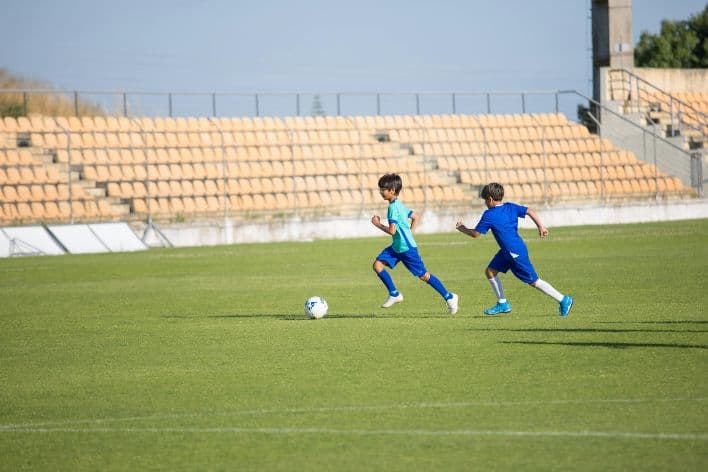Holistic Benefits of playing Football for Kids
By Pinkey Sharma |
Date 07-08-2024

Table of Contents
- Physical Health Benefits of Playing Football for Kids
- Mental Benefits for Children of Playing Football:
- Advantages of Playing Football at an Early Age:
- Benefits of Football Participation for Youth:
- Health Benefits of Playing Football for Kids:
- Mental Benefits of Kids Playing Football:
- Social Benefits of Playing Football for Kids
- The Benefits of Playing Walking Football Game for Kids:
- Conclusion:
- Frequently asked questions:
- Related blogs:
Admissions Open for
Football, otherwise spelt as soccer, is not a game in some world culture. It is a global happening that enchants millions of fans and players of all classes and age groups everywhere. For kids, in particular, football is an incredible gateway to conduct physical activity, learn significant life skills, and have genuine fun. This article encompasses all the advantages of playing football entails for the kid in terms of his physical as well as psychological development, and why it is an essential aspect for a kid to have started playing football from a young age.
Physical Health Benefits of Playing Football for Kids
Cardiovascular Fitness:
Perhaps one of the most significant benefits of playing football is the improvement in cardiovascular health. Football is a high-intensity, aerobic play where lots of running is involved, and as a result, it works the heart and lungs. If children play the game frequently, they will have built a substantial cardiovascular system, minimizing the possibility of heart diseases and ensure good health.
Muscular Strength and Endurance:
It is a game that involves much running, jumping, and kicking, which thus develops muscular strength and endurance. Playing football develops different muscle groups: the legs, core, and upper body. This overall development of muscular strength gives better posture, balance, and coordination.
Flexibility and Agility: Football is a game that requires quick movements, changes in direction, and instant stops. Such skills enhance flexibility and agility, which are of great importance in football and any other aspect of physical development. Thereafter, improving flexibility and agility has the effect of influencing safety and improved performance in other sports and activities.
Weight Management:
Football is great for getting rid of those extra pounds one wants to get rid of, as the physical demands for the game can really be tiring. It burns quite a large number of calories and helps keep one at a healthy weight. Playing football on a regular basis will definitely help ward off childhood obesity and inculcate healthy habits.
Bone Strength:
Weight-bearing activities such as running and jumping in football increase bone density. The activities facilitate bone growth and eventually make the bones dense, which is quite essential while a child is still growing. This therefore reduces the risks of bone fracture and osteoporosis at later stages of life.
Boosts Immunity:
Regular exercise can boost the immune system, and more so, that of football. Exercise allows the immune cells to move through the body even faster, thus the body can react to an infection appropriately and timely. This, therefore, shows that children who play football on a regular schedule have higher immune systems and fewer incidences of ailments.
Mental Benefits for Children of Playing Football:
Cognitive Improvement:
While people think of football as a physical sport, it is more of a mental game. Football involves strategy and is, thereby, a way of solving problems and making decisions on time. Kids learn what moves others
are likely to make, learn how to plan their next move, and be flexible in challenging situations on the field. It is a cognitive skill that can be applied in academic situations and in day-to-day life.
Concentration and Focus:
Football is a fast-paced game and requires constant concentration and focus. Players have to focus on the ball, their fellow teammates, and opponents, all while taking split-second decisions at high speed. This relentless mental engagement will increase attention span and focus, which again will be useful for kids in their academic pursuits.
Stress Relief:
Playing football offers an avenue for kids to let off some steam and excess energy. Exercise releases the natural endorphins, usually known for their mood-enhancing ability. While children are participating in football, the physical aspect of the game assists in diffusing and managing stress, hence reducing anxiety and elevating one's mood. It is also a healthy way to release emotions and energy, ultimately improving mental well-being.
Self-Esteem and Confidence:
Success in achieving goals, enhancing skills, and becoming an object of praise by coaches and fellow players will increase self-esteem and confidence. There are so many opportunities within football to excel, even if it is scoring a goal, making a great pass, or just being part of a winning team—the list goes on.
The other significant benefit of football is discipline and responsibility.
It teaches children the meaning of discipline and responsibility. The regularity of the training, the rules of the game, and commitment to the respective teams foster discipline. Kids learn the value of hard work, punctuality, and following instructions: very important lessons in life.
Football is a team game, hence it involves communication, cooperation, and teamwork implicitly. Children learn to work together for one common goal and how their fellow teammates are both strong and weak. They will therefore form strong social bonds by working together. These social skills help form relations and be successful in a collaborative environment.
Advantages of Playing Football at an Early Age:
.jpg)
Development of Skills at an Early Age:
Early exposure to football allows children to develop the basic motor skills at an early age. Basic abilities, like running, jumping, kicking, and eye-hand coordination, are enhanced by playing soccer regularly. A strong base at an early age developed in skill formation helps in further athletic pursuits and all-round physical development.
Healthy Lifestyle Habits:
Introduction of children to football at an early age makes the adoption of healthy lifestyle habits by default. Daily physical activity becomes a part of their routine, thus fostering long-term health and well-being. These habits may lead to a reduced risk of chronic diseases and, at the same time, a much better quality of life when growing up.
Kids who are introduced to football at an early age are more likely to develop a life-long commitment to sports and physical activity, for example, having a life-long passion for sports like football that will always keep them active and healthy.
The lessons of discipline, focus, and teamwork being imbibed through playing football have proven to be transferable to the classroom and to social life. Kids involved in football do much better in school, with higher attendance rates and larger self-supporting social networks. The things they learn in the field help them in many ways in life.
Benefits of Football Participation for Youth:
Structured Environment:
Youth football programs try to keep children in a structured environment so that they can learn and develop. Structured practices, drills, and games facilitate that process. The structure ensures that there are proper coaching and guidance in which potential kids can maximize.
They develop a sense of belonging within a football team and therefore a sense of identity. The children perform in the roles that include a sense of community, which is very necessary for emotional and social development. In addition, it builds a support network or a source of motivation.
Positive Role Models:
Many of the youth football programs include many coaches, as well as older players, who would tend to end up being a positive role model within the game. The way in which they could inspire kids and motivate children through teaching them about key values that would be necessary in their lives would involve aspects of sportsmanship, respect, and how to persevere. A positive role model guides a child in lifelong developmental aspects.
Competitive Spirit:
Football instills in kids a competitive spirit that is healthy. It fills a sense of drive towards perfection, and in the process, goals are set and worked upon. Football, due to the competitive nature, makes one learn how to be a graceful loser and winner in everything, thereby instilling resilience and determination.
Youth football also brings out leaders, effective motivators, efficient communicators, and the like in players who emerge as captains and leaders on the field. Balancing practice with schoolwork and every other activity also begets effective communication and time management.
Health Benefits of Playing Football for Kids:
Cardiovascular Health:
From the preceding discussion, it is eminent that football is a great cardiovascular exercise. Routine engagement in the said exercise optimizes heart health and includes a reduction of blood pressure as well as minimizes the risks of developing cardiovascular diseases. Cardiac health is a prominent dragger in pursuit of health and long life.
It helps one maintain a healthy weight through the burning of calories and physical activities involved. Childhood obesity is a rising health issue, and football gives children a very fun way to counteract it. Kids who play football are more likely to have a healthy body weight and lesser body fat.
Better sleep:
Physical activity, such as playing football, generally elicits better sleep. Children participating in regular exercise appear to fall asleep faster and experience deeper and more restful periods of sleep. Good sleep is essential for growth, development, and well-being.
Increased Immunity:
Regular physical activity, including playing football, increases immunity. A boosted immune system helps children fight illnesses and infections. This idea bears fewer sick days away from school and excellent overall health.
Motor Skill Development:
Football is a game that involves all types of movements which help in developing fine and gross motor skills. Kicking, dribbling, passing, and shooting inculcate coordination, balance, and dexterity within the player. As a matter of fact, motor skills are very much necessary for physical development and day-to-day activities as well.
Mental Benefits of Kids Playing Football:

Cognitive Development:
For instance, football develops this cognitive advancement through the essence of strategic thinking, quick decision-making, and problems solving by kids. These exposures to cognitive skills are transferable to their academic grades and everyday situations, thereby contributing to their intellectual growth.
Improved Focus and Concentration:
Football from an early age creates this fast pace that one needs to follow continuously. Children thus quickly learn the art of paying attention to a couple of stimulations, processing the information, and reacting back in time. This hence bears the benefit of improving focus and concentration that would help in their academics and other activities.
Stress Reduction and Emotional Development:
Football is an excellent exposure for the youth to handle stress and emotions. Many endorphins are released through physical activity that helps a person feel good and lowers stress and incidences of anxiety. By playing football, kids can manage their stress, build emotional resilience, and enhance the general well-being.
Self-esteem and Confidence:
Goals and skills in football, when achieved, enhance one's self-esteem and confidence. This is further enhanced by the positive reinforcement from coaches and teammates. A strong sense of self-worth and confidence is important in personal development and success.
Discipline and Responsibility:
It is instilled through regular practice, adherence to rules, and commitment to the team. These ideals are, in reality, the core building blocks of success, both personal and academic, because they provide a general view of work ethics and accountability to kids.
Social Benefits of Playing Football for Kids
Teamwork and Cooperation:
Football, being a team game, goes parallel with communication, cooperation, and teamwork. This helps a child to develop the ability to work as a team member toward common objectives, take decisions concerning the strength and weaknesses of fellow teammates, and form good social bonds. These social skills are critical ingredients for building relations and success in collaborative environments.
Communication skills:
Effective communication plays a big role in and off the football pitch. The kids develop clear and effective communication with teammates and coaches. All these communication skills learned are valuable for all the aspects of life—from academic pursuits to personal relationships.
Leadership and Teamwork:
Football creatively provides opportunities for leadership among kids. Captains and leaders emerge on the field and learn to motivate and guide their teammates. Leadership skills are essential for successful careers and personal lives, and through this skill, a child can build up his or her character and have confidence, whereas other features of leadership are very significant to influence others in a positive manner.
Soccer also provides the art of conflicts or disagreements. Whether it be a dispute with a rival teammate or jostling with a hard-nosed opponent, children learn very valuable conflict resolution. These are very important qualities in maintaining healthy relationships or dealing with life's challenges.
Cultural awareness and diversity:
Football unites people from a different part of the world. Kids who play this game always become exposed to so many new cultures, traditions, and views. This condition is probably going to help the kid develop an ability of awareness and consideration of other people's cultures, an empathetic and respectful condition of diversity.
The Benefits of Playing Walking Football Game for Kids:
Introduction to Walking Football:
Walking football is traditional football but minus the running. Predominantly, it involves the elder age brackets but is also a fun sport for kids. Walking football retains the skills, tactics and social benefits of football without having to run at high intensities.
Physical Benefits of Walking Football:
Walking football, apart from being low impact, can also be a great game for kids either just learning the game of football or inhibited by their physical capabilities. It still allows them to receive cardiovascular benefits, increases muscular strength, and improves coordination.
Psychological and Social Indicators of Walking Football:
Walking football develops concentration and thought and how to build up a strategy. Also, it enhances social abilities, teamwork, and communication. As this game is a slow game, vibrant participation makes kids develop much more evolved skills while enjoying the social aspects.
Transition to Traditional Football:
Walking football can be a stepping stone to traditional football. The kids gain confidence through the development of basic skills while they get a chance to participate comfortably in the game. When they become more confident and skilled they can advance to the more intense forms of football.
Conclusion:
The advantages of playing football for children are enormous and cover physical, mental, social, and personality developments. Clearly, football provides the best opportunity for children to keep healthy, learn life skills, and have fun. Whether it is traditional football, youth programs, or walking footballs, the merits of playing them are immense.
Frequently asked questions:
What are the 5 benefits of playing football?
-
Improved Physical Health: Enhances cardiovascular fitness, muscular strength, and overall physical endurance.
-
Mental Well-being: Reduces stress and anxiety while boosting self-esteem and confidence.
-
Social Skills: Promotes teamwork, communication, and cooperation among peers.
-
Cognitive Development: Enhances strategic thinking, problem-solving skills, and quick decision-making.
-
Discipline and Responsibility: Teaches commitment, punctuality, and adherence to rules.
Why is football important for kids?
Football is important for kids because it promotes physical health, mental well-being, social skills, and life skills such as discipline and teamwork, all while providing a fun and engaging activity.
Is football good for the brain?
Yes, football is good for the brain as it enhances cognitive development, improves focus and concentration, and stimulates strategic thinking and problem-solving abilities.
What do kids love about football?
Kids love football because it is exciting, allows them to make new friends, provides opportunities for teamwork and competition, and gives them a chance to showcase their skills and achieve goals.
Liked what you read? Feel free to share this article with your friends and spread the knowledge!
Related blogs:
Mental Skill in Football: Boost your football performance with key mental skills such as- focus, strategy, and resilience!
Introduction to Football for Kids: Get our comprehensive guide to introducing football to kids: rules, skills, benefits, and tips for a fun start!
CBSE Schools In Popular Cities
- CBSE Schools in Bangalore
- CBSE Schools in Mumbai
- CBSE Schools in Pune
- CBSE Schools in Hyderabad
- CBSE Schools in Chennai
- CBSE Schools in Gurgaon
- CBSE Schools in Kolkata
- CBSE Schools in Indore
- CBSE Schools in Sonipat
- CBSE Schools in Delhi
- CBSE Schools in Rohtak
- CBSE Schools in Bhopal
- CBSE Schools in Aurangabad
- CBSE Schools in Jabalpur
- CBSE Schools in Jaipur
- CBSE Schools in Jodhpur
- CBSE Schools in Nagpur
- CBSE Schools in Ahmednagar
- CBSE School In Tumkur

Call Us to know more about Orchids
Swipe Up



.jpg&w=1920&q=80)












